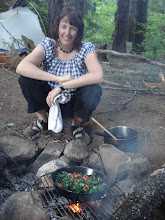In the middle of our month's travel through the north, we found ourselves stuck in Agra for an unexpected extra night (due to thick fog and a malfunctioning ILS at the Agra airport). Exhausted from long bus rides, insouciant touts, and endless transport delays, we splurged and stayed the night at a family-run guest house near the airport called New Bakshi House (and it really was a splurge at $42 for the two of us, including breakfast and a hot shower, when we were used to paying around $10 a night). The main treat at Bakshi House, however, was not the comfortable beds or hot water, nor even the delicious home style food, but the lovely hostess, Rani, who shared her recipes with me. As I banged on about my love of palak and paneer, Rani assured me this Indian cheese was very simple to make, and gave me her recipe, as well as others for kuku, alu palak, malai kofta, ghobi, yoghurt, and another I wrote down as 'a Chinese dish'. Although she was adamant that paneer was very simple to make, I perhaps simply wasn't a confident enough cook yet to believe her. It in fact took me nearly a decade before I attempted to make my own. Here is Rani's recipe:
Paneer
Boil 1 litre half & half (her sister-in-law Tina had lived in America for 17 years, so perhaps she introduced the half & half idea?). Add 2 tspn lemon juice. As soon as milk curdles, remove from heat. Put cheesecloth in sieve. Pour milk mixture through & cover lightly. Leave 1 ½ hours or more (you may rinse the curd at this stage if you've added too much lemon juice).
I think that for many years I simply didn't trust the simplicity of this operation. Surely the paneer wouldn't form? Trust me, it does every time, just like that. I now use ordinary full cream milk, and for a family of five I find I need to do about 3L to make enough paneer for a meal (it makes about 500g). I also usually press mine as it rests in the sieve, unless I'm making paneer koftas, since I'll be crumbling the paneer anyway. I also save the whey, which you can use if you're making chapatis or parathas. If not, as per @crazybrave's suggestion recently, I simply add it to the chook scraps.
Here's what I did with my most recent paneer, which I will usually make before lunch if I want it for dinner. This recipe is adapted from my favourite Indian cookbook, bought in Calcutta, “Desi Khana: The Best of Indian Vegetarian Cooking” by Tarla Dalal.
Palak Paneer Kofta
Koftas: for 500g paneer, I add about 4T plain flour, chopped coriander to taste (loads!), chopped chilies to taste, pinch of bi-carb soda and salt to taste. Form into balls and deep fry until golden brown. Rest on paper towels.
Paste: bash up loads of garlic, pistachios, poppy seeds (not too many as they're bitter), ginger & chili (if no children will share this meal) – all to taste, which means lots of garlic especially in our house. Tarla adds grated coconut, but when I was short of any, I actually used coconut cream & just add it after the other ingredients fried for a bit. She also uses cashews, which would be equally delicious I'm sure!
Chop up a giant bunch of spinach and cook it lightly with about ½ cup of water until it's fully wilted. Blend the spinach to a puree and set aside.
Heat ghee in a cast iron frypan and cook the paste for 3-5 minutes, until 
My kids adore this dish, as do adults. You can serve it with rice and naan or pappadums. If you make it spicy, it's worth serving a raita as well. As for the paneer, it's also delicious simply on its own – I have to hide it from the kids while I'm cooking or there's never enough...

No comments:
Post a Comment